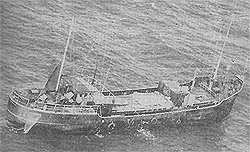
Radio Delmare
Encyclopedia

Radio North Sea International
Radio North Sea International also known as Radio Nordsee International in German and Radio Noordzee Internationaal in Dutch, was a European offshore radio station, run by the Swiss firm Mebo Telecommunications, jointly owned by Swiss engineer, Edwin Bollier, and his business partner, Erwin Meister...
went off the air. A lot of work went into getting money on the table for this project and with a very low budget, in May 1977 they bought MV "Aegir." They worked to make it sea worthy and broadcast ready. Unfortunately the first drawback came much too early, on Friday June 23 1978, people from the Dutch RCD (Radio Control Office) and police boarded the ship. The father of one of the crew members did not want to see his son going on this adventure and notified the official authorities.
Preemptive Raid
For a year and a half, they managed to keep their project secret - even the free radio society insiders knew nothing about it. Had everything gone as planned and they would have managed to pass customs, then the first broadcast from the station, called Radio Nordzee International, would have been on air on Monday the 26th of June 1978. Because of the raid was this no longer possible; with a truck they removed all their possessions: AM and FM-transmitters, the whole studio line-up, thousands of records, record- and tape archive, books, diagrams etc.International Waters
The damage was about €20,000, but the ship was not confiscated and so they used it to go out immediately into the open sea. Food, oil and everything else we needed was still on board, so they could hold it out for some time.Early July they went into the harbour of Maassluis (near Rotterdam) with the name of the ship changed into "Flip". Two weeks later they went into the town Hendrik-Ido-Ambacht, where the anchor chain was pulled on-board. Through the Zeelandbrug (Sealandbridge) we went on July 16 to Oostende (Belgium) where a week later the transmitters were brought on board. This was registered by a camera-team from Veronica TV who showed this operation in their television program called "Info."
Among the equipment that brought onboard in Oostende were 2 Marconi transmitters which came from the Belgium army, 3 kW power each. Though when bringing them on board they got a little damaged, such as the endtubes, that was the cause why the first broadcasts didn't work out so well. Only a few hundred Watt was managed to pull out of them, nevertheless because of the advertisers they had to go into the air and so it was decided to get going with it. The studio-equipment contained 2 Revox A77 reelrecorders, 4 FTM-spotmasters, 2 Thorens turntables, 2 AKG-microphones and a mixer with multi channels.
Broadcasting
They changed the station's name from Radio Nordzee International to "Radio Delmare," never "Weekend Music Radio" as up till then by the Press had dubbed the project. For theme tune they choose to take the title "The Eve Of The War" from Jeff WayneJeff Wayne
Jeffry "Jeff" Wayne, born in Forest Hills, Queens, New York, is a musician best known for Jeff Wayne's Musical Version of The War of the Worlds, his musical version of H. G. Wells' The War of the Worlds...
.
Despite the miserable power, they were received by a rather big audience. Over 2000 listener reports, which were sent to then, showed that we not only could be heard in the Netherlands and Belgium at the coastal areas but also further into the country and even from England reports were sent.
The modulation was for the first days very poor, but due to some hard work they were after a few days already able to improve it and the rest of the test broadcasts went, according to the circumstances, rather good. During those first days we aired old program tapes from Radio Caroline and some non-stop programs, who were that is true done live, but contained not much spoken words. The diskjockey from the first hour was Rene de Leeuw, he became bored quickly from that non-stop music and rather wanted to go over into real spoken programs which he endured daily for 7 hours in a row.

